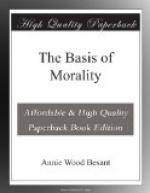Hence we may ever, having judged as best we can, act boldly, and learn increased wisdom from the result.
Much moral cowardice, paralysing action, has resulted from the Christian idea of “sin,” as something that incurs the “wrath of God,” and that needs to be “forgiven,” in order to escape an artificial—not a natural—penalty. We gain knowledge by experience, and disregard of a law, where it is not known, should cause us no distress, no remorse, no “repentance,” only a quiet mental note that we must in future remember the law which we disregarded and make our conduct harmonise therewith. Where conscience does not speak, how shall we act? The way is well known to all thoughtful people: we first try to eliminate all personal desire from the consideration of the subject on which decision is needed, so that the mental atmosphere may not be rendered a distorting medium by the mists of personal pleasure or pain; next, we place before us all the circumstances, giving each its due weight; then, we decide; the next step depends on whether we believe in Higher Powers or not; if we do, we sit down quietly and alone; we place our decision before us; we suspend all thought, but remain mentally alert—all mental ear, as it were; we ask for help from God, from our Teacher, from our own Higher Self; into that silence comes the decision. We obey it, without further consideration, and then we watch the result, and judge by that of the value of the decision, for it may have come from the higher or from the lower Self. But, as we did our very best, we feel no trouble, even if the decision should be wrong and bring us pain. We have gained an experience, and will do better next time. The trouble, the pain, we have brought on ourselves by our ignorance, we note, as showing that we have disregarded a law, and we profit by the additional knowledge in the future.
Thus understanding conscience, we shall not take it as a basis of morality, but as our best available individual light. We shall judge our conscience, educate it, evolve it by mental effort, by careful observation. As we learn more, our conscience will develop; as we act up to the highest we can see, our vision will become ever clearer, and our ear more sensitive. As muscles develop by exercise, so conscience develops by activity, and as we use our lamp it burns the more brightly. But let it ever be remembered that it is a man’s own experience that must guide him, and his own conscience that must decide. To overrule the conscience of another is to induce in him moral paralysis, and to seek to dominate the will of another is a crime.
* * * * *
III
UTILITY




